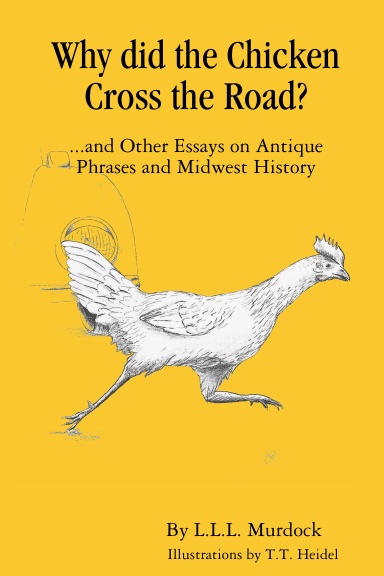For centuries, the age-old question has intrigued and amused countless individuals: why did the chicken cross the road? This seemingly simple query has sparked debates, laughter, and even philosophical musings. From satirical takes to existential ponderings, this question continues to capture our collective imagination. Let's delve into the surprising and hilarious reasons behind this classic conundrum.
As we explore the various interpretations of this timeless riddle, we'll uncover a range of perspectives that shed light on its enduring appeal. Whether it's through humor, satire, or deep introspection, the story of the chicken crossing the road offers something for everyone. So, buckle up for an entertaining journey as we examine some of the most interesting answers to this eggsistential question!
From Minstrelsy to Modern-Day Satire
The origins of the Why did the chicken cross the road? joke can be traced back to minstrel shows, where it was used to mock societal norms and reinforce stereotypes. These performances often relied on exaggerated characters to elicit laughter, but they also served as a form of social commentary. Over time, the joke evolved, shedding its controversial roots while retaining its ability to provoke thought and amusement.
In contemporary times, the joke has taken on new dimensions, reflecting current issues and trends. For instance, satirical pieces may incorporate political themes or cultural critiques, transforming the innocent chicken into a symbol of broader societal concerns. By doing so, these modern interpretations breathe fresh life into an old favorite, ensuring its relevance in today's world.
This evolution highlights how adaptable and versatile the joke truly is, allowing it to resonate with diverse audiences across generations. As society changes, so too do the meanings we assign to this simple yet profound question.
Chickens Crossing Roads: A Political Perspective
Some interpretations of the chicken's journey focus on political undertones, using humor to address serious topics like immigration and law enforcement. In these versions, the chicken becomes a metaphor for individuals seeking better opportunities or fleeing oppressive conditions. Such narratives challenge us to reconsider our perceptions of borders and belonging, encouraging empathy and understanding.
Moreover, these politically charged explanations often reflect the complexities of real-world issues, illustrating how even lighthearted jokes can carry weighty implications. By framing the chicken's actions within a larger context, we gain insight into the struggles faced by marginalized communities striving for freedom and equality.
In essence, these renditions remind us that humor can serve as a powerful tool for sparking dialogue and fostering connection, turning an ordinary question into a platform for meaningful discussion.
An Eggsistential Exploration
On a more philosophical level, the chicken's decision to cross the road invites contemplation about purpose and identity. What drives any living being to venture beyond familiar territory? Is it curiosity, necessity, or simply the desire to experience something new? These questions strike at the heart of what it means to exist, prompting deeper reflection on our own motivations and aspirations.
From this perspective, the chicken's act represents a universal quest for meaning and fulfillment. It challenges us to embrace uncertainty and take risks, even when the outcome remains unknown. After all, isn't life itself a series of crossings—physical, emotional, and spiritual—that shape who we are?
Thus, the chicken's journey serves as both a mirror and a guide, urging us to explore the depths of our existence while celebrating the joy found in discovery and growth.
Better Reasons for Crossing
While the original punchline—to get to the other side—may lack flair, countless variations offer far more entertaining explanations. Some suggest the chicken sought adventure, love, or revenge, while others attribute its motives to whimsy, rebellion, or divine intervention. These creative responses not only enhance the joke's appeal but also demonstrate the boundless potential of human imagination.
Furthermore, such inventive retellings highlight the importance of perspective; what seems mundane to one person might hold great significance for another. By embracing multiple viewpoints, we enrich our understanding of the world and deepen our appreciation for its intricacies.
In conclusion, the myriad reasons given for the chicken's crossing underscore the beauty of diversity in thought and expression, proving that even the simplest questions can lead to profound insights.
A Divine Message Through Feathers
For some, the chicken's act carries spiritual significance, symbolizing faith, liberation, and redemption. In this interpretation, the road represents obstacles or trials that must be overcome to reach salvation. By crossing over, the chicken embodies hope and perseverance, reminding us of God's unwavering love and guidance.
This religious angle adds another layer of depth to the joke, inviting believers to see everyday events as opportunities for spiritual growth. It encourages trust in divine plans, even when circumstances appear daunting or unclear. Through this lens, the chicken's journey transforms into a testament of faith and resilience.
Ultimately, whether viewed as comedy, critique, or creed, the tale of the chicken crossing the road continues to inspire and enlighten, proving that sometimes, the simplest stories hold the greatest truths.
Topic vs Contribution: Understanding Perspectives
Just as scholars distinguish between a dissertation's topic and contribution, so too can we differentiate between the literal act of crossing a road and its symbolic implications. While the physical movement itself may seem straightforward, the underlying reasons reveal much about the chicken's character and intentions. This distinction invites us to look beyond surface-level details and consider the broader impact of actions.
Similarly, when crafting narratives or arguments, recognizing the difference between content and context enhances clarity and effectiveness. By focusing on contributions rather than mere descriptions, we create works that resonate more deeply with readers, offering valuable insights and connections.
In the end, understanding these nuances allows us to appreciate the richness of storytelling, whether it involves chickens, roads, or anything else under the sun. And perhaps that's the true magic of this timeless riddle—it teaches us to seek meaning in everything we encounter, no matter how ordinary it may seem.

